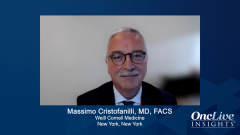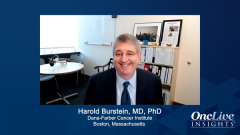
Evolving Treatment Landscape of HR+/HER2- Metastatic Breast Cancer
Massimo Cristofanilli, MD, FACS, provides a historical overview of the HR+/HER2- metastatic breast cancer (mBC) treatment landscape.
Episodes in this series

Transcript:
Massimo Cristofanilli, MD, FACS: Hormone receptor-positive metastatic breast cancer is the most common condition that we as medical oncologists deal with after the patient has a recurrence. As we know, the most common type of breast cancer is hormone receptor-positive disease, and these tumors tend to recur in a predictable way, particularly when they have high-risk conditions including node involvement, large size, and high recurrence score, in the bone, soft tissue, and sometimes in the organs. For these patients, traditionally the treatment has been single-agent androgen therapy. Originally, it was only tamoxifen; subsequently, for postmenopausal women we had different aromatase inhibitors that showed improvement in the progression-free survival, but never showed an improvement in survival. Then Faslodex [fulvestrant], one of the SERDs [selective estrogen receptor degraders] that was used in comparison with aromatase inhibitors in this specific setting, appeared to be superior, particularly in patients with bone disease.
Now in the last 7 years, we had a tremendous improvement in patient outcomes by testing the different CDK4/6 inhibitors. For the first time, we have seen a significant improvement in progression-free survival across the different medical conditions, particularly in patients with bone disease, visceral metastasis, endocrine sensitivity, and endocrine resistance. These have translated to a significant improvement in overall survival in the majority of patients and majority of studies. Interestingly enough, the benefit is seen particularly in patients who have been treated up front, first line, with a combination CDK4/6 and aromatase inhibitor in postmenopausal patients. This has been seen also in a group of patients in the premenopausal setting. It appears that the more sensitive subset of patients are the ones who benefit the most. Finally, an important aspect with regard to the possibility of prolonged survival and quality of life is a delay in the use of chemotherapy. Sometimes this is large number of months, more than 20 months in some of the studies. This obviously represents an unprecedented result compared to what traditionally we had available for these patients.
With regard to hormone receptor-positive metastatic breast cancer, we have an increased understanding of the biology of the disease, particularly with a molecular test, to see mutations that are associated with this disease, one of them being PIK3CA mutations. For the first time, the FDA approved targeting a specific set of mutations in the PIK3CA gene. This is now an available second-line treatment where the drug, alpelisib, has been FDA approved. This treatment is usually used after progression on CDK4/6 inhibitors. This represents a significant proportion of patients because this mutation is present in approximately 30% of patients with metastatic hormone receptor-positive disease. There has been no indication that different variants of PIK3CA mutations have different sensitivities. So across the board, the most common PIK3CA mutations are sensitive to alpelisib. This drug is available to patients whose cancer progresses. The other group of patients most recently is the ER [estrogen receptor]-positive BRCA2 germline mutations. For these patients there is the availability of different PARP inhibitors, olaparib and talazoparib. This is expanding the possibility to treat these patients with a targeted approach based on alterations in germline DNA and not in the somatic mutations.
Transcript edited for clarity.







































